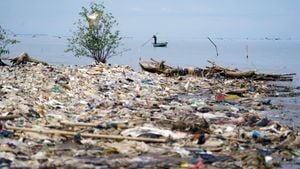Hurricane Helene’s devastating impact has left communities across multiple states grappling with destruction, loss of life, and the stark reality of climate change. This latest storm, which transitioned from hurricane status to tropical storm as it travelled inland, has reignited discussions around preparedness and the disproportionate risks faced by marginalized communities.
With its arrival at the end of September 2024, Helene initially made landfall near Perry, Florida, as a Category 4 hurricane and proceeded to wreak havoc as it moved through the Southeast, particularly targeting North Carolina. The storm’s legacy brought unprecedented rains—some areas reported nearly 14 inches, with Hartsfield-Jackson Atlanta International Airport recording 12 inches and establishing new rainfall records.
By the time Helene cleared the Atlanta metropolitan area, nearly 200 lives had been claimed, with many more individuals still unaccounted for. The storm marked the beginning of what is becoming all too familiar: communities suffering under the weight of climate-induced disasters, leading to calls for urgent action to mitigate the impacts of such storms.
“They had never forecasted a major hurricane within 60 hours for a disturbance below tropical storm level,” stated meteorologist Sam Lillo, highlighting the unprecedented speed with which Helene intensified. Lillo's observations echo growing concerns from the scientific community about the changing dynamics of storm development, largely attributable to global warming.
Unfortunately, the impacts were felt most acutely within Black communities throughout the Southeast. Nearly half of Black residents live within the eleven states most affected by hurricanes, including Georgia and North Carolina. Research from McKinsey indicates these groups are almost twice as likely to be affected by hurricanes compared to their white counterparts, attributed to long-standing structural inequalities and racially discriminatory practices concerning land use and development.
During Helene, Atlanta’s Buckhead neighborhood, which is predominantly white and affluent, saw significant flooding alongside affected Black neighborhoods, demonstrating the widespread nature of the storm’s impact yet again. Michael Mann, professor of Earth and Environmental Science at the University of Pennsylvania, noted, “Helene is a poster child for the ways human-caused climate change is amplifying the coastal threat from intensified hurricanes combined with rising sea levels.”
The aftermath of Helene has shifted the focus to how communities are being prepared—or inadequately prepared—for the increasing incidence of severe weather. Regrettably, the damage is not merely physical; it impacts the very infrastructure upon which communities depend. Essential services, including hospitals, were overwhelmed, with Mission Hospital finding itself lacking basic supplies like food and water amid the chaos.
On the ground, individual stories reveal the human toll of the storm. One individual shared their experience of losing power and being stranded without cell service, having to travel to neighbors’ homes to check on them. Many were left isolated, grappling with the loss of fundamental resources and community support during the disaster response.
The narrative extends beyond sheer destruction—it invites scrutiny of the broader systems at play. For example, Workers and community leaders across racially marginalized sectors have voiced concerns over unequal aid distribution post-Hurricane Helene. Many fear historical precedence plays out yet again, where working-class and minority groups receive disproportionate assistance compared to their more affluent, predominantly white neighbors.
Political responses have flowed from this catastrophe. Vice President Kamala Harris offered continuous federal support as she visited North Carolina disaster zones, emphasizing the need for long-term assistance for impacted communities. Her voiced gratitude for both officials and citizens coming together to aid each other stands as testimony to the human spirit amid disaster.
Former President Donald Trump, on the other hand, criticized federal responses, echoing sentiments of neglect. This kind of politicization of natural disasters raises alarms not just about the disaster aid but also about political accountability and the failures of infrastructure planning.
Adding to the discussion of climate change, experts reiterate the connection between rising ocean temperatures and the severity of hurricanes. Bob Bunting, CEO of the Climate Adaptation Center, underscored how warmer air can lead to storms carrying more water vapor, intensifying rainfall when conditions are ripe.
According to Bunting, the National Centers for Environmental Information reported 2023 as the hottest year on record, which supports the hypothesis of increasingly severe weather phenomena. Each consecutive hurricane season appears to bear scars of this increasing volatility stemming from systemic climate change.
Sarasota, for example, grapples with the aftermath of multiple hurricanes, with Helene joining the likes of Irma and Idalia as one of the many storms reshaping the region’s socio-economic structure. Recent statistics show Sarasota County has suffered substantial financial loss from these storms, with damage estimates reaching hundreds of millions.
Local government’s response to these hurricanes has also shifted. After learning from previous events, officials now utilize systematic approaches to unify shelter operations more efficiently, ensuring resources are accessible to those most affected, adhering to lessons learned from disasters past.
Planning and response strategies continue to adapt as the reality of living with climate change becomes ever clearer, highlighting the necessity of reevaluated models for disaster preparedness. Communities are urged to embrace proactive efforts to shield their infrastructures against increasingly hostile weather patterns, ensuring the investment of resources goes toward sustainable practices.
The stories of Asheville, NC, speak volumes to the new normal of living with the impacts of climate change. Once perceived as somewhat insulated from severe weather impacts, Helene laid bare the town’s vulnerability. The area suffered significant loss of trees and infrastructure as mudslides buried highways, showcasing how no place is truly safe from nature’s fury.
A call for innovative change reverberates throughout affected communities, as leaders highlight the urgent need for updated disaster response frameworks. Climate scientists and community leaders alike argue for government and societal accountability, pushing for investments not only to repair but more critically, to rethink how we engage with our environment, advocating for long-term solutions beyond reactive measures.
Despite the dark realities posed by such storms, the response has ignited discussions around resilience and adaptation strategies for the future, aiming to cultivate sustainable practices across regions. Many hope Hurricane Helene proves to be more than just another name on the list of devastating storms. Instead, it could catalyze change through awareness, preparedness, and community engagement to build resilience against what is now being termed the new norm of climate disasters.
Were these changes not made, storms like Helene would likely continue to bring tragedy, loss, and displacement, fundamentally altering the landscapes of entire communities, emphasizing just how important it is to take action now for the safety of future generations.



